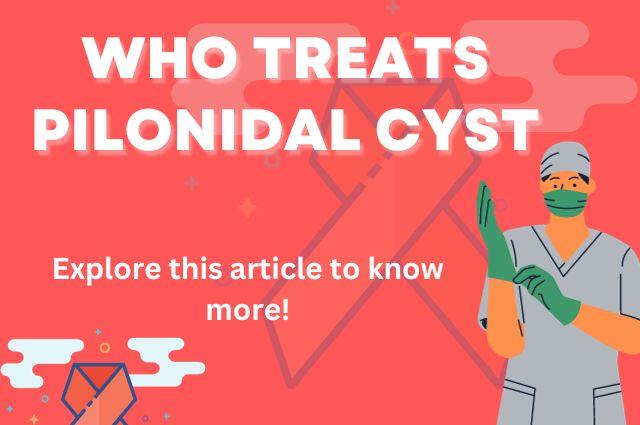Pilonidal cysts are typically treated by healthcare professionals, particularly those specializing in dermatology, general surgery, or colorectal surgery. The specific healthcare provider who treats pilonidal cysts may depend on factors such as the severity of the cyst, the individual’s medical history, and the available healthcare resources.
Pilonidal cysts can cause discomfort and inconvenience, affecting individuals in the sacrococcygeal region. To effectively address this condition, it’s important to recognize its symptoms and understand its underlying causes. Before we move on to knowing the specialist who treats this condition, let us first explore the common symptoms associated with pilonidal cysts.
Symptoms of pilonidal cysts
Some of the common symptoms that pilonidal cysts may manifest are as follows:
Pain and swelling
Pilonidal cysts typically manifest as a painful, tender lump near the tailbone. The area may become swollen, red, and warm to the touch.
Abscess formation
In some cases, the cyst may become infected, leading to the development of an abscess. This can cause increased pain, the formation of a pus-filled pocket, and potential drainage of foul-smelling discharge.
Discomfort when sitting or walking
Due to the cyst’s location, activities that put pressure on the area, such as sitting or walking, can exacerbate the pain and discomfort.
Itching and irritation
The presence of a pilonidal cyst can cause itching and irritation in the affected area.
Drainage sinus tracts
In chronic or recurrent cases, small openings called sinus tracts may form, allowing continuous drainage of fluid or pus.
Causes of pilonidal cysts
Let us now get to know the potential causes behind their development, which will provide valuable insights into this prevalent skin condition:
Hair follicle blockage
Pilonidal cysts often develop when hair follicles in the sacrococcygeal region become obstructed with hair, debris, or skin cells. This blockage can trigger the formation of a cyst.
Excessive hair growth
Individuals with excessive or coarse hair growth in the area are more prone to developing pilonidal cysts.
Friction and pressure
Prolonged periods of sitting or activities that involve repetitive friction in the buttock crease area can contribute to the development of cysts.
Poor hygiene
Inadequate hygiene practices, such as insufficient cleansing or excess moisture, can increase the risk of infection and cyst formation.
Congenital predisposition
Some individuals may have a higher susceptibility to pilonidal cysts due to genetic factors or anatomical variations in the sacrococcygeal region.
It is important to recognize the symptoms and understand the causes of pilonidal cysts, as this will help in prompt diagnosis and appropriate treatment. If you experience symptoms such as pain, swelling, or abscess formation in the sacrococcygeal area, it’s important to seek medical attention
What doctor treats pilonidal cysts?
If you are dealing with a pilonidal cyst, then it can be uncomfortable and bothersome. Therefore, when seeking where I can get a pilonidal cyst removed, it is important to know which healthcare professionals are pilonidal cyst surgeons. Hence, let us now get acquainted with the healthcare providers who commonly treat pilonidal cysts.
General Surgeons
General surgeons are the primary healthcare professionals who treat pilonidal cysts. They have expertise in surgical procedures and can perform a wide range of treatments, including incision and drainage, cyst removal, and advanced wound care techniques. Moreover, these professionals provide both non-surgical and surgical options, depending on the severity and complexity of the cyst.
Colorectal Surgeons
For more complex cases or recurrent pilonidal cysts, a colorectal surgeon may be involved in your treatment. Colorectal surgeons specialize in conditions affecting the colon, rectum, and anus, including pilonidal cysts. Their extensive knowledge of this area allows them to perform more intricate surgical procedures, such as wide excision and flap closures, to effectively address the condition and prevent recurrence.
Dermatologists
Dermatologists, who specialize in diagnosing and treating skin conditions, can also play a role in the management of pilonidal cysts, particularly in milder cases. They can provide initial evaluations, prescribe medications such as antibiotics or topical treatments, and offer guidance on proper hygiene practices to prevent infection and recurrence. However, in more severe cases, dermatologists may refer you to a general or colorectal surgeon for further treatment.
Wound Care Specialist
In some cases, particularly when the pilonidal cyst becomes infected or complicated, a wound care specialist may be involved in the treatment. They can provide expertise in managing and promoting healing of the surgical site. When it comes to treating pilonidal cysts, healthcare professionals such as
-
General surgeons
-
Colorectal surgeons
-
Dermatologists, etc, are well-equipped to provide the care you need.
Their specialized knowledge and expertise in managing this condition ensure that you receive the most appropriate treatment, whether it involves
-
Non-surgical interventions
-
Surgical procedures
-
Ongoing follow-up care
Consulting with these professionals will help alleviate your discomfort. They will also guide you toward a successful treatment plan for your pilonidal cyst. Hence, if you are suffering from such a condition then instead of trying to treat it yourself, consult a doctor at the earliest. They will be able to guide you to the right specialist. In addition, they will also help you in diagnosing if the cyst is due to an underlying health condition or not. Leaving a pilonidal cyst untreated could lead to further risks.








